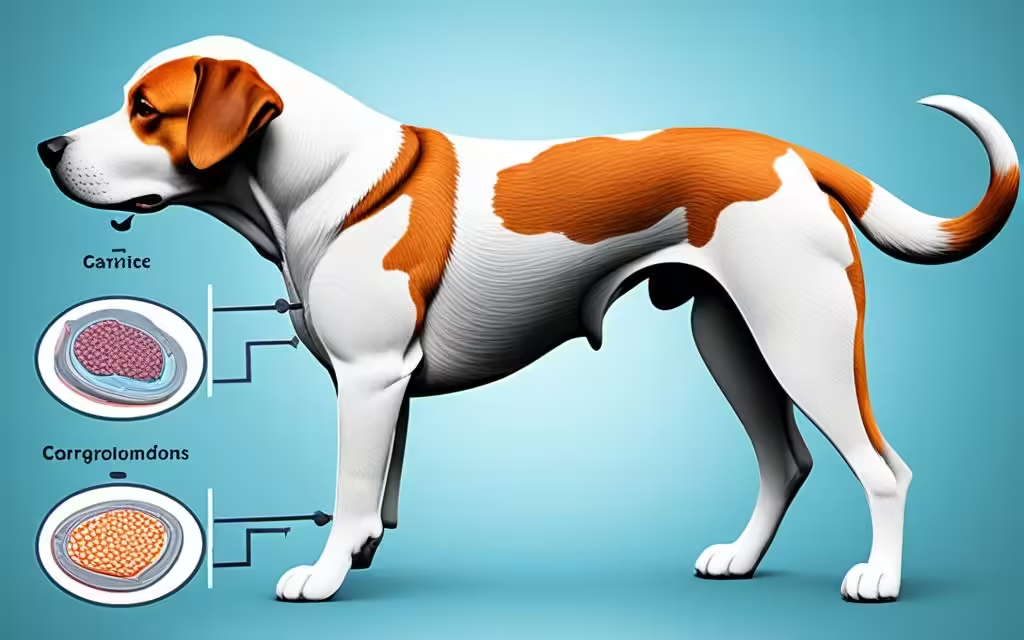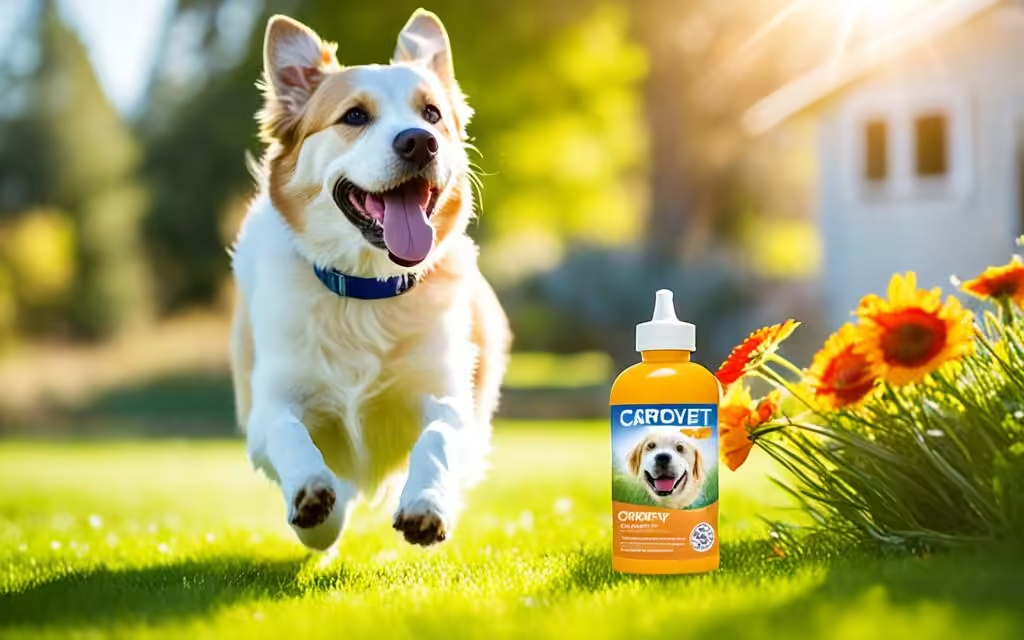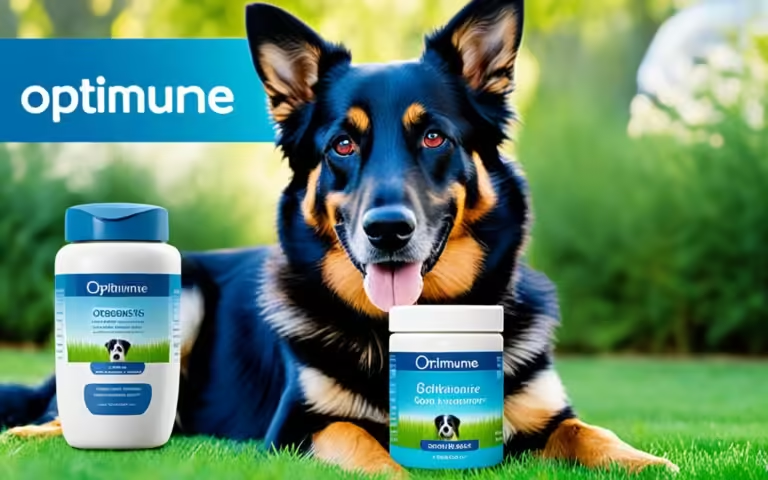Carprovet for Dogs: Safe Pain Relief for Canines
In the United States, one in four dogs suffers from osteoarthritis. This condition causes a lot of pain and discomfort1. Carprovet is a safe and effective solution for these dogs. It’s a non-steroidal anti-inflammatory drug (NSAID) that the FDA has approved for pain and inflammation from osteoarthritis and after surgery in dogs1.
Carprovet, also known as Rimadyl®, is a strong yet flexible medication. It helps dogs with different painful conditions1. If your dog has hip dysplasia, after surgery, or chronic arthritis pain, Carprovet can help. It’s a vet-approved way to ease their pain and make their life better1.
Carprovet comes in tablets and caplets, making it easy to give to your pet2. The usual dose is 2 milligrams per pound of your dog’s weight. But, your vet might change the dose for your dog’s specific needs1. When used as told, Carprovet is a safe and non-addictive way to help dogs with pain and swelling1.
Table of Contents
What is Carprovet for Dogs?
Carprovet, also known as carprofen, is a non-steroidal anti-inflammatory drug (NSAID). It is often given to dogs for pain relief and to manage inflammation3. Like ibuprofen and naproxen, carprofen is a popular choice for helping dogs with pain4.
Definition and Overview
Carprovet is a medication that needs a vet’s prescription and is approved by the FDA for dogs4. It is a type of propionic acid derivative. This means it has a special structure that helps reduce inflammation and pain in dogs3. Vets use Carprovet to help dogs with conditions like osteoarthritis, post-op pain, and joint issues3.
Active Ingredient: Carprofen
The main part of Carprovet is carprofen, a white crystal with the formula C15H12ClNO2 and a molecular weight of 273.724. It dissolves easily in ethanol but not in water at room temperature4. This makes it effective in treating pain and inflammation in dogs4.
“Carprofen is a non-steroidal anti-inflammatory drug designed to reduce swelling and pain due to arthritis, surgery, or joint problems in dogs.”4
How Does Carprovet Work for Dogs?
Carprovet is a special drug that helps dogs with pain and swelling5. It’s different from human painkillers like ibuprofen or aspirin because it’s made just for dogs5. Carprovet works by stopping the production of certain chemicals that cause inflammation.
COX Enzyme Inhibition
Carprovet works by stopping certain enzymes in the body called COX5. There are two types of COX enzymes: one that helps with normal body functions and another that causes inflammation5. Carprovet targets the inflammation-causing enzyme, reducing pain and swelling without harming the stomach or kidneys like some other drugs do5.
This means Carprovet can help dogs with conditions like arthritis by reducing pain and swelling5. It’s a good choice for long-term pain relief because it’s safer than some other options5.

Carprovet is great for treating conditions like arthritis in dogs because it reduces pain and swelling5. It targets the inflammation without harming the stomach or other important organs5.
“Carprovet, as a targeted COX-2 inhibitor, provides a safer alternative to non-selective NSAIDs in the management of canine pain and inflammation.”5
Vets and pet owners can use Carprovet to help dogs with pain and swelling, knowing it’s a safe choice5.
Uses of Carprovet for Dogs
Osteoarthritis Pain and Inflammation
Vets often recommend Carprovet for dogs with osteoarthritis pain and inflammation6. It works as an NSAID to lessen inflammation and ease pain in dogs with joint disease7. Carprofen in Carprovet is a go-to for pain relief in dogs because it’s safer than human NSAIDs8.
Post-Operative Pain Management
Carprovet is also approved for post-op pain in dogs6. Vets use it to help dogs recover from surgeries like spays, neuters, and hip replacements7.
Studies show Carprovet is safe and effective for dogs with osteoarthritis and post-op pain687. It helps reduce inflammation and ease pain, making dogs more comfortable.
“Carprovet has been a game-changer in managing my dog’s arthritis pain. The anti-inflammatory benefits have made a noticeable difference in her mobility and comfort.”
– Veterinary Client
Carprovet is great for both arthritis and post-op pain in dogs67. It’s safe and works well, making it a top choice for vets and pet owners687.
Dosage and Administration
Carprovet is a vet-approved NSAID for dogs, offered in chewable tablets and oral caplets9. It comes in sizes of 25 mg, 75 mg, and 100 mg. This lets you give the right dose based on your dog’s weight9.
Tablet or Caplet Form
Carprovet is easy to give to your pet, with chewable tablets and caplets available. They’re made for different weight ranges. This makes sure your dog gets the right dose easily9.
Dosage Chart Based on Dog’s Weight
The right dose of Carprovet is 2 mg per pound of body weight. It can be given once or twice a day9. Vets give a chart to help owners figure out the right amount for their dogs.
| Dog Weight | Carprovet Dosage (once or twice daily) |
|---|---|
| Up to 10 lbs | 25 mg |
| 11-24 lbs | 75 mg |
| 25-49 lbs | 100 mg |
| 50 lbs and above | 100 mg twice daily |
Carprovet’s dose depends on your dog’s weight. Most pets eat the chewable tablets happily9. Vets suggest watching how your dog reacts to the medicine. Adjust the dose as needed for the best pain relief and inflammation control10.

carprovet for dogs: Potential Side Effects
Common Side Effects
Carprovet, like other NSAIDs, may cause mild side effects in dogs. These can include a decrease in appetite, vomiting, diarrhea, feeling tired, and changes in behavior11. These signs often point to problems with the digestive system, liver, or kidneys12.
Severe Side Effects and Precautions
In rare cases, Carprovet can cause serious side effects. These include severe vomiting or diarrhea, liver or kidney damage, increased thirst and urination, jaundice, feeling very tired, difficulty moving, seizures, or severe allergic reactions13. If you see any worrying signs, stop the medication and call your vet right away12.
It’s best not to use Carprovet with other anti-inflammatory drugs to avoid bad reactions11. Dogs at high risk include those who are dehydrated, on diuretics, or have kidney, heart, or liver problems11.
How a dog reacts to a drug can vary. Dogs that had bad reactions to one NSAID might have them with another11. Carprovet is not safe for puppies under 6 weeks, pregnant dogs, dogs meant for breeding, or nursing mothers11.
“Serious adverse reactions associated with NSAIDs can occur without warning and may result in rare situations in death.”11
Watch your dogs closely for any bad reactions and stop Carprovet if you see any signs. Always talk to a vet for help and treatment if your dog has a bad reaction to NSAIDs.
Contraindications and Risk Factors
Carprovet is usually safe and effective for dogs, but some conditions and drug interactions need careful thought before giving it14. Dogs with bleeding disorders like Von Willebrand disease, low platelet counts, or past allergic reactions to Carprovet or similar drugs should not take it14. Vets might suggest blood tests to check for these issues before giving Carprovet.
Pre-Existing Conditions
Be careful with Carprovet in dogs that have liver, kidney, heart, or stomach problems14. Dogs over six weeks old and those under six weeks should be watched closely for side effects14. Pregnant or nursing dogs also need extra care when taking Carprovet14.
Drug Interactions
Use Carprovet with caution or avoid it with other drugs like blood thinners, ACE inhibitors, steroids, cyclosporine, insulin, and some diuretics14. Vets will check all the dog’s medicines to prevent harmful mix-ups before giving Carprovet14.
Carprofen sticks to plasma proteins over 99%15. It reaches its highest levels in the blood in 1-3 hours after taking it by mouth15. After a single dose, it stays in the body about 8 hours15. Carprofen also affects the immune system and stops certain substances that cause bone loss and pain15.
Carprovet is a top choice for dogs by vets for pain and swelling16. It’s known by many names like Rimadyl®, Novox®, Vetprofen®, and others16. It’s FDA-approved for dogs and sometimes used for small mammals and reptiles, but not cats16.
Vets must think about a dog’s health history and current medicines before giving Carprovet. Knowing the risks helps pet owners and vets work together for the best care for dogs141516.
Monitoring and Safety Guidelines
Before starting your dog on Carprovet, your vet will do baseline bloodwork and urinalysis17. For ongoing use, check liver and kidney values every two to four weeks after starting, then every three to six months17. Watch your dog for any bad reactions and call your vet right away if you see any problems17.
Carprovet can cause stomach issues like vomiting and diarrhea in dogs18. About 2% of dogs might feel tired18. Serious issues like stomach ulcers, liver, or kidney failure are rare but can happen if you give too much or mix it with other meds18. Most dogs get better if you stop the drug and give them care18.
It’s key to keep an eye on your dog with regular blood tests, especially at the start and every six months if they’re on it long-term18. Call a vet right away if your dog shows signs of a bad reaction, like throwing up, diarrhea, being very tired, drinking more, stumbling, or having seizures19.
Carprovet helps dogs with pain and swelling, but you must follow your vet’s advice and watch your pet’s health closely19. Being alert and quick to act can keep your pet safe and well while on this medication19.
Comparison with Other NSAIDs
Carprovet is as effective as other approved NSAIDs for dogs20. These drugs, like Galliprant®, Rimadyl® (Carprofen), Deramaxx™, and Previcox®, stop prostaglandins. These are chemical messengers in the body20.
Dogs are more sensitive to NSAID side effects than humans20. So, vets must think about the dog’s health, possible drug reactions, and how the dog reacts before giving these drugs20.
Efficacy and Cost Considerations
Carprovet, also known as Rimadyl®, is often used for arthritis and inflammation in dogs19. It works fast, reaching its peak in 1-3 hours, and helps with post-op pain19. Galliprant® is great for long-term arthritis care in dogs, especially if they’ve had bad reactions to other NSAIDs before20.
There are both branded and generic Carprovet options, making it easier on pet owners’ wallets19. Vets can help pick the best NSAID for a dog’s needs, health, and the owner’s budget20.
“Carprovet has shown to be as good as other approved NSAIDs, with costs varying by the type of formulation available.”
Tips for Safe Use of Carprovet
As a pet owner, it’s important to use Carprovet safely and effectively for your dog. Here are some key tips to keep in mind when giving this non-steroidal anti-inflammatory drug (NSAID) to your dog:
- Follow Veterinary Guidance: Always follow the dosage your vet recommends. Carprofen comes in three strengths: 25 mg, 75 mg, and 100 mg21. Give your dog 2 mg of Carprofen per pound of body weight daily. You can split the dose for twice a day if needed21.
- Administer with Food: Give Carprovet with food to reduce stomach side effects.
- Monitor for Side Effects: Watch your dog for side effects like stomach problems, liver issues, skin reactions, and more21. If you see any bad reactions, stop the medicine and call your vet right away.
- Secure Medication Storage: Keep Carprovet away from your dog to avoid accidental ingestion. This keeps your pet safe and prevents overdose or misuse.
- Inform Your Veterinarian: Tell your vet about any other meds or supplements your dog is on, as Carprovet might interact with them21. Dogs allergic to the ingredients, with certain health conditions, or on interacting meds should not take Carprofen21.
- Cautious Use in Special Circumstances: Use Carprofen carefully in puppies under six weeks, older dogs, pregnant or nursing females, and dogs with heart, kidney, liver, or stomach issues21. It can slow bone healing after surgery and affect lab tests, giving false results21.
Following these guidelines ensures safe and effective use of Carprovet for your dog’s pain relief. Always talk to your vet for personalized advice and to discuss any concerns about your pet’s medication and health.
Carprovet works fast, providing pain relief in one to two hours21. But, don’t use it with other NSAIDs, steroids, certain meds, or supplements without a vet’s okay21.
“Responsible pet ownership includes diligently following medication guidelines to ensure the safety and well-being of our canine companions.”
By following these tips, you can help your dog with pain and swelling while lowering the risk of side effects. Remember, talking to your vet is crucial for the best and safest use of this medication.
Conclusion
Carprovet is a prescription drug that helps dogs with pain and inflammation. It’s often used for dogs with osteoarthritis or after surgery22. A vet should guide its use to make a dog more comfortable and improve their life quality23.
But, pet owners need to watch out for possible side effects and things to avoid with Carprovet23. Keeping a close eye on the dog, working with a vet, and following the dosage is key for safe use24. By balancing its benefits and risks, Carprovet can help dogs feel better and move easier222324.
Studies show Carprovet can be a safe choice for dogs with pain and swelling22. But, more research is needed to see how it stacks up against other drugs22. With the right vet advice and careful use, Carprovet can be a big help for dogs24.
FAQ
What is Carprovet for Dogs?
What is the active ingredient in Carprovet?
How does Carprovet work for dogs?
What are the uses of Carprovet for dogs?
How is Carprovet administered to dogs?
What are the potential side effects of Carprovet in dogs?
When should Carprovet not be used in dogs?
How should Carprovet be monitored and used safely in dogs?
How does Carprovet compare to other NSAIDs for dogs?
What tips are important for the safe use of Carprovet in dogs?
Source Links
- Carprofen (Rimadyl) For Dogs: Safe Dosages and Uses
- What To Expect if your Dog Is on Carprofen
- No title found
- Carprovet (carprofen) Caplets
- No title found
- Carprovet (Carprofen) Flavored Tablets for Dogs
- Carprovet (Carprofen) 75mg Flavored Tablets for Dogs
- Carprofen for Dogs: Uses, Effectiveness & Side Effects
- Dechra CarproVet (Carprofen) Chewable Tablets 100mg I NSAID For Relief of Pain & Inflammation In Dogs | Medi-Vet
- Carprofen for Dogs: Uses, Dosage & Risks
- Carprovet (Carprofen) 100mg Flavored Tablets for Dogs
- No title found
- Carprofen For Dogs: The Side Effects To Be Aware Of
- Carprofen for Dogs: Uses, Dosage & Risks
- Carprofen for Dogs: Uses, Dosage, Side Effects – Drugs.com
- Carprofen for Dogs: Uses, Side Effects, and Dosage
- Dechra CarproVet (Carprofen) Caplet 75mg I NSAID For Relief of Pain and Inflammation in Dogs | Medi-Vet
- Rimadyl for Dogs (Carprofen) – DogCancer.com
- Carprofen (Rimadyl®)
- NSAIDs for Dogs: Everything You Need to Know
- Carprofen for Dogs: Pain Treatment, Dosage, Side-Effects and More – One Vet
- In dogs diagnosed with osteoarthritis, is meloxicam superior to carprofen for reducing patient discomfort?
- Carprofen For Dogs: The Side Effects To Be Aware Of
- NSAIDs for Dogs: Understanding the Benefits and Risks







